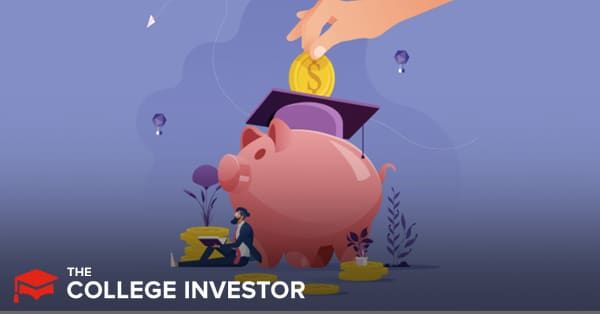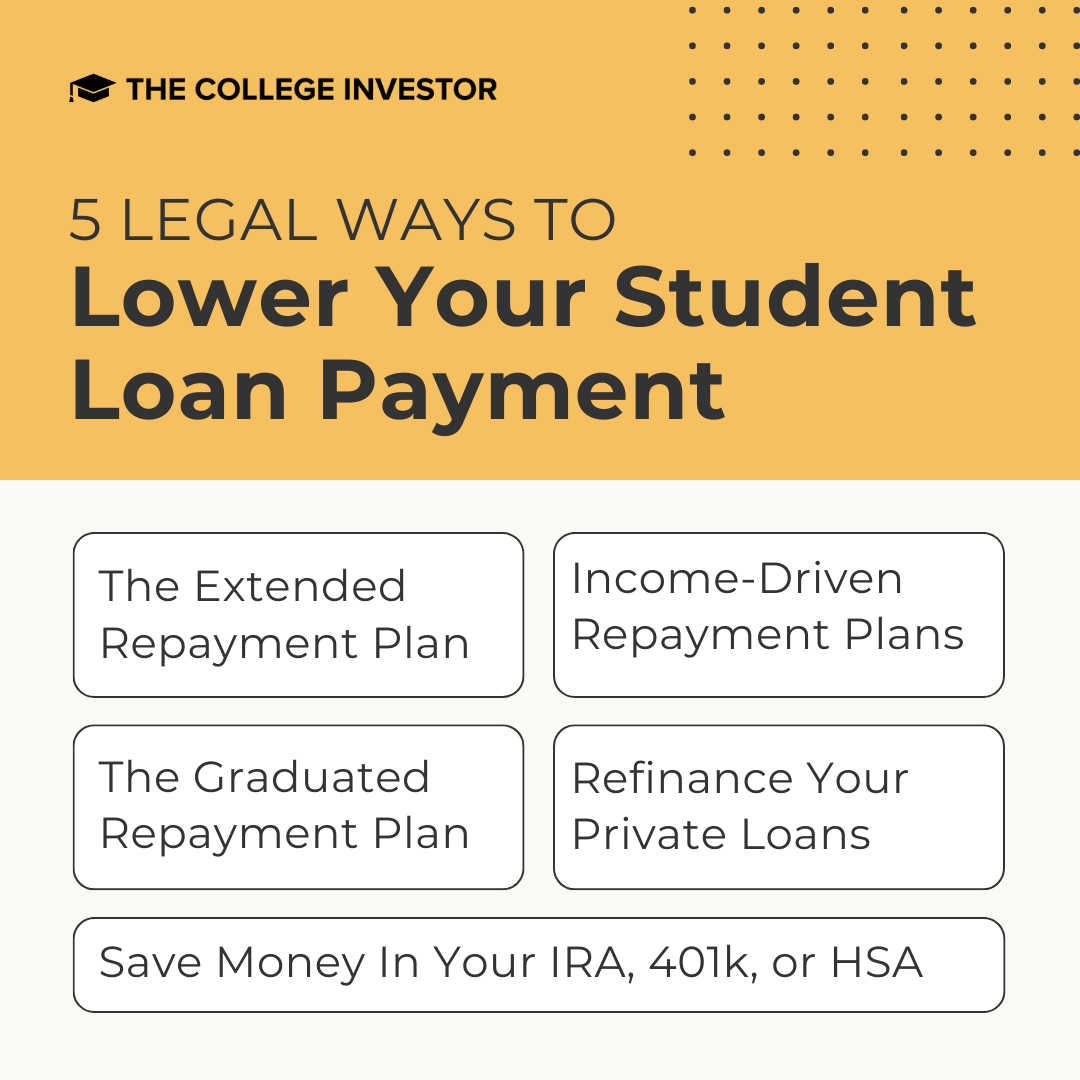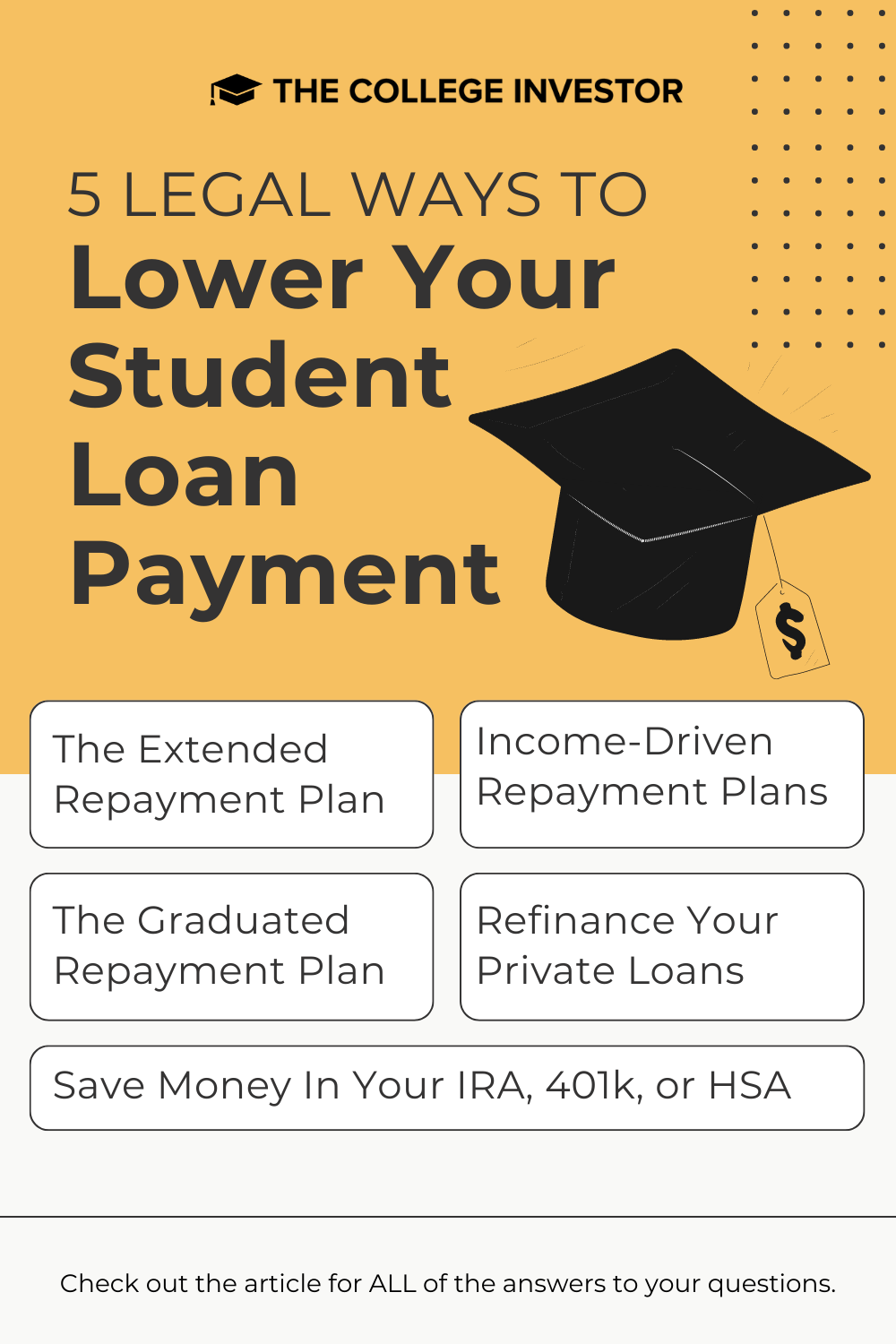
Don't you wish you could lower your student loan payment? It's possible, and legal, do work some "magic" to get your student loan payment lower.
If you don't do anything with your student loans, you're automatically signed up to a generic repayment plan that typically has even payments for 10 years. However, that can be tough, especially right after graduation.
Maybe you've just started working, or maybe you don't even have a job yet and you're just side hustling to make a little money? Maybe that standard repayment plan option just isn't working for you, and you're worried what will happen if you don't make a payment or you default. Maybe you haven't looked at your student loans since before the payment pause?
If you're considering student loan deferment or forbearance, or if you're thinking about simply ignoring your student loan payments, don't!
Here are five legal ways that you can lower your student loan payment so you don't have to go into default.
The Example
To really show you the difference that each plan can make for you, we're going to use the hypothetical example of the following:
You have $38,000 in student loan debt.
Your standard 10-year repayment plan amount would be $381 per month.
We're going to assume you only make $24,000 per year (remember, you don't have a "real" job yet after graduation).
Lower Your Student Loan Payment Video
1. The Extended Repayment Plan
The extended repayment plan extends out your standard student loan payment from 10 years to 25 years.
The extended repayment plan is available to all Federal student loan borrowers - no income limits apply to this. So, it's always an option for borrowers.
In our example, if you were to switch to the extended repayment plan, you would lower your student loan payment to $196 per month.
You can switch to this plan simply by calling your loan servicer or going online to StudentAid.gov.
2. The Graduated Repayment Plan
The graduated repayment plan starts off your repayment at a low amount, and it rises over time. There are two versions - the 10 year graduated plan, and the 25 year extended graduated plan. The idea with this plan is that you'll earn more in the future, so you start low and your payment grows.
Both of them start with a low payment amount.
On the 10-year graduated plan, you would lower your student loan payment to $213 per month in year 1, but remember it will rise to as high as $638 per month in year 9.
On the 25-year graduated plan, you would lower your student loan payment to $120 per month in year 1, but remember it will rise to as high as $359 per month in year 24.
You can switch to the graduated repayment plan simply by calling your loan servicer or going online to StudentAid.gov.
3. Income-Driven Repayment Plans
There are several income-driven repayment plans that can lower your student loan payments.
Income-Based Repayment (IBR)
Income-based repayment (IBR) is exactly what it sounds like - your payment will be calculated based on your income. It's a formula that takes into consideration your income, the poverty line for your state, and will set your payment at 15% of your income (10% for new borrowers).
The other great aspect of IBR is that you qualify for student loan forgiveness on any amount of debt left on your loan after 20 or 25 years, depending on when your loans originated. We call this the secret student loan forgiveness program.
If you took out your student loans before July 1, 2014, your payment would be as low as $77 per month.
If you took out your student loans after July 1, 2014, you could lower your student loan payment to as low as $52 per month.
PAYE and SAVE
Pay As You Earn (PAYE) and Saving on a Valuable Education (SAVE) are the two newest student loan repayment plan options, and they also come with student loan forgiveness after 20 years (or as little as 10 years with SAVE).
They both calculate your payment a little differently, but for our situation, they are both identical. However, starting in 2024, SAVE is going to use a different calculation - only 5% of your discretionary income which could save you a ton of money each month!
With both of these plans, your payment will be calculated based on 10% of your discretionary income (in mid-2024 that drops to 5% for SAVE). As such, you could lower your student loan payment to as low as $52 per month.
The new SAVE repayment plan would have your monthly payment be $0 per month if you make $24,000 per year.
Just like IBR, you need to re-certify your income every year, and your payment could change as your income changes over time. You can sign up for this plan by calling your lender or going online to StudentAid.gov.
Related: Understanding Income-Driven Repayment Plans
4. Save Money In Your IRA, 401k, or HSA
This may sound crazy, but did you know that you can lower your student loan payment by investing money in an IRA, 401k, or HSA? Seriously - why wouldn't you want to save for yourself versus giving your money to your loan servicer.
If you remember, all income-driven repayment plans base your monthly payment on your adjusted gross income (AGI). So, if you lower your adjusted gross income, you also lower your student loan payment.
In 2024, you can contribute the following amounts:
- Traditional IRA: $7,000 (see our full IRA contribution limits guide)
- 401k: $23,000 (see our full 401k contribution limits guide)
- HSA: $8,300 (see our full HSA contribution limits guide)
Going back to our example of making $24,000 per year, you're not going to be able to contribute much... but maybe you can?
If you can lower your AGI to just $21,800, your monthly payments on IBR or PAYE would drop to $0. That means you just need to contribution $2,200 to your IRA, 401k, or HSA. If you do that, no student loan payments!
This trick to lower your student loan payments becomes much more valuable the more income you earn.
5. Refinance Your Private Loans
Finally, if you have private student loans, you don't have a lot of options. The best option is to simply refinance your student loans.
There are a lot of factors in whether this could actually lower your payment, but that's why we recommend using a free tool like Credible that allows you to quickly and easily see what student loans you'd qualify for, and if it would even help you lower your payment.
For example, if you currently have a $38,000 student loan, and it's at 6.8%, you could be paying $437 per month.
If you're able to refinance your student loan with Credible to 4.25%, you could lower your student loan payment to $389 per month.
Plus, College Investor readers get a special bonus of up to a $1,000 gift card when they close their loan! You won't find a better deal! Check out Credible here.
If you don't believe us, check out this list of all the places to refinance student loans.

Getting Professional Help
It sounds like it could be confusing, but it doesn’t have to be. You can sign up for these programs for free at StudentLoans.gov.
If you want more help, start with your lender. They are paid to help you with your student loan debt. They might not be able to answer everything, but it's a good starting point.
After that, look at apps like Chipper, which can track all your loans, find a better repayment plan, and even apply all inside the app. Check out Chipper here >>
If you're not quite sure where to start or what to do, consider hiring a CFA to help you with your student loans. We recommend The Student Loan Planner to help you put together a solid financial plan for your student loan debt. Check out The Student Loan Planner here.
Always Look To Lower Your Student Loan Payment Before Not Paying
The biggest challenge I see with new student loan borrowers is fear that they can't afford their payment. As a result, many opt for student loan deferment or forbearance. Some even simply ignore their student loans and hope they go away.
So, before you simply stop paying your student loans, look at these options to lower your student loan payment. For Federal loans, it's pretty easy to do. For private loans, it's a bit more challenging, but you can make it happen.

Robert Farrington is America’s Millennial Money Expert® and America’s Student Loan Debt Expert™, and the founder of The College Investor, a personal finance site dedicated to helping millennials escape student loan debt to start investing and building wealth for the future. You can learn more about him on the About Page or on his personal site RobertFarrington.com.
He regularly writes about investing, student loan debt, and general personal finance topics geared toward anyone wanting to earn more, get out of debt, and start building wealth for the future.
He has been quoted in major publications, including the New York Times, Wall Street Journal, Washington Post, ABC, NBC, Today, and more. He is also a regular contributor to Forbes.
Editor: Clint Proctor Reviewed by: Chris Muller
